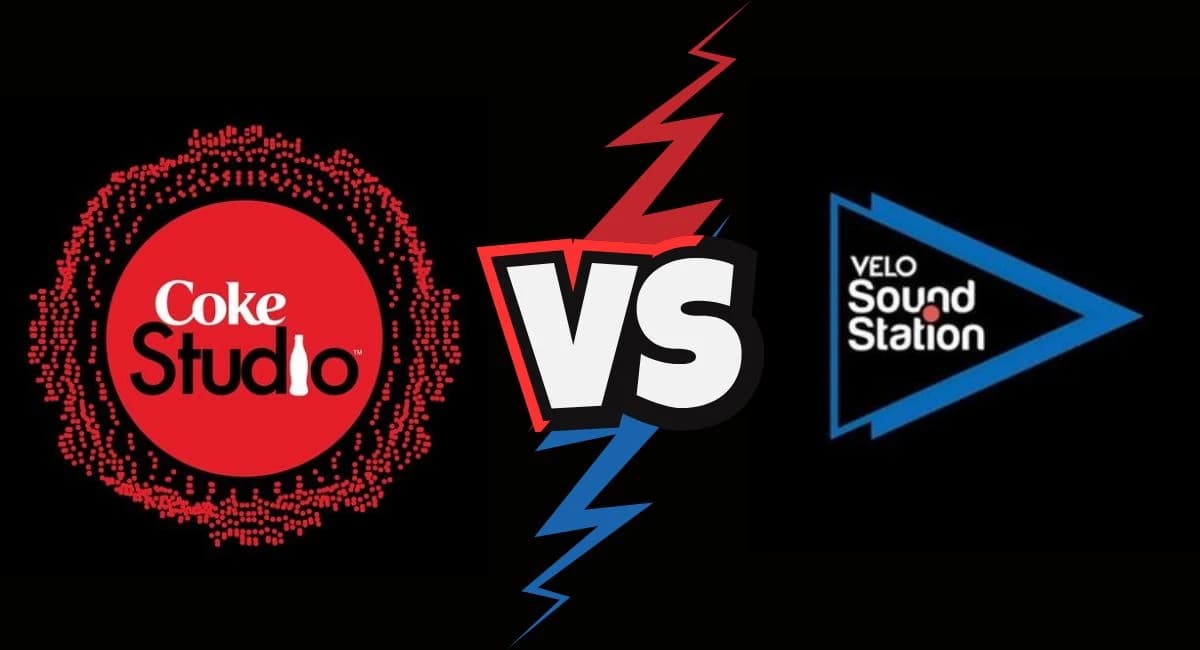© 2025 Roz UpdatesbyTETRA SEVEN

* All product/brand names, logos, and trademarks are property of their respective owners.
Pakistan’s music scene has undergone a striking transformation over the past two decades, and at the heart of this evolution lie two branded juggernauts: Coke Studio and Velo Sound Station. These platforms have become cultural powerhouses, not only redefining how music is consumed in the country but also amplifying South Asian sounds for a global audience.
Launched in 2008, Coke Studio pioneered a uniqVelo Sound Stationue format—bringing together folk traditions, classical roots, and contemporary flair. It carved out a loyal following both domestically and internationally, gaining a reputation for musical integrity and soulful fusion. Each season became an event, featuring A-list vocalists, seasoned instrumentalists, and carefully curated compositions that turned into instant hits.
In contrast, Velo Sound Station arrived as the new kid on the block, sleek and cinematic. Backed by the directorial vision of Bilal Lashari and targeting a younger, style-conscious demographic, Velo hit the ground running with a high-energy aesthetic and an experimental vibe. With tight, pop-centric episodes and cutting-edge visuals, it became a fresh alternative to Coke Studio’s more traditional format.
As 2025 unfolds, fans find themselves in a cultural tug-of-war. Coke Studio dropped a season that blends spiritual anthems and cross-border collaborations, while Velo fired back with slick visuals and genre-defying tracks. From Instagram reels to Spotify playlists, the question on everyone’s mind is: who nailed it this year?
In this blog, we pit the two music titans against each other—analyzing their content, visuals, engagement, and overall impact. Whether you’re a Coke Studio loyalist or a Velo Sound Station convert, this deep dive will help you decide which show truly dominated the desi soundscape in 2025.
Coke Studio continued its tradition of pushing creative boundaries while honoring Pakistan’s rich musical heritage. This season featured a remarkable blend of legendary voices and next-gen talent. The return of iconic artists like Abida Parveen alongside rising stars such as Abdul Hannan and Annural Khalid demonstrated the platform’s commitment to bridging generational divides.
Standout performances included the spiritually evocative “Piya Piya Calling,” a global viral sensation. The mix of languages—Urdu, Pashto, Punjabi, and even Balochi—reinforced the platform's commitment to cultural inclusivity and regional representation.
Helmed by Xulfi and his seasoned production team, the artistic direction of Coke Studio leaned into themes of unity, identity, and transcendence. The set design blended traditional motifs with futuristic backdrops, reflecting the show’s ongoing dialogue between past and present.
Musically, the season veered towards spiritual fusion, minimalist instrumentation, and poetic storytelling. Songs didn’t just entertain—they resonated with audiences on a deeper emotional and philosophical level. The inclusion of social themes such as mental health, peace, and cultural pride added further depth, elevating the series beyond entertainment into social commentary.
Coke Studio's global footprint grew even stronger this year. Multiple tracks from Season 15 were featured in Spotify’s “Viral 50” playlists in countries including India, Canada, and the UAE. International YouTubers reacted to performances with praise, while Pakistani expats across North America and Europe used the show as a nostalgic bridge to home.
The show’s ability to go viral—while still staying authentic—has made it a rare blend of critical acclaim and mass popularity. With a loyal fanbase and a continually evolving format, Coke Studio remains the gold standard in South Asian music television.
Velo Sound Station’s 2025 season made an unapologetic return with a bolder, flashier, and more experimental approach than ever. With every episode curated like a music video, Velo took visual storytelling to new heights—LED-lit stages, couture styling, and choreographed performances that blurred the line between a live set and a cinematic trailer.
Musically, the show leaned heavily into electro-pop, synthwave, and genre-blending tracks that catered to Gen Z’s global palette. Artists like Hasan Raheem, Shamoon Ismail, and Natasha Noorani delivered genre-pushing performances that quickly became chart-toppers on Spotify and local FM radio stations alike. One of the season’s viral hits, a bilingual pop-rap track titled “Dil Ruba”, broke language barriers and topped YouTube Pakistan’s trending list for weeks.
Under the directorial helm of Bilal Lashari—famed for The Legend of Maula Jatt—Velo Sound Station brought cinematic polish to every second of airtime. Unlike Coke Studio’s spiritual and cultural immersion, Velo positioned itself as the pulse of urban youth. Each episode was a short, curated burst of performance-driven music designed for rapid digital consumption.
The show’s format—shorter, highly stylized, and visually explosive—mirrored platforms like TikTok and Instagram Reels. This alignment with youth culture gave Velo a significant edge in digital-native viewership, especially in urban centers like Karachi, Lahore, and Islamabad.
From Instagram filters to trending Twitter hashtags, Velo Sound Station 2025 dominated online conversations. Influencers, fashion bloggers, and music critics dissected each episode, often praising its visual flair and sonic audacity. While some purists argued it lacked emotional depth compared to Coke Studio, many lauded Velo for daring to break away from formulaic desi music tropes.
Its fresh appeal also helped spotlight underground and independent musicians, giving them a mainstream platform without compromising on edge or individuality. In the race for cultural relevance, Velo Sound Station proved that sleek, bold, and experimental can thrive in Pakistan’s evolving music ecosystem.
When it comes to pure musical experimentation, both Coke Studio and Velo Sound Station brought strong but distinctly different offerings to the table in 2025. Coke Studio leaned heavily on genre fusion, blending qawwali, sufi rock, and indigenous rhythms with modern orchestration. Tracks like “Mehram” and “Piya Piya Calling” showcased how traditional South Asian music could be reimagined for a global palette.
Velo Sound Station, on the other hand, went full throttle on pop innovation. It took risks with synth-heavy compositions, rap-infused verses, and EDM-inspired beats. While Coke focused on storytelling and emotional depth, Velo embraced catchy hooks, club-ready production, and sharp visual identity. In terms of sheer genre disruption, Velo arguably led the charge.
Coke Studio’s broader appeal spanned generations. From nostalgic Boomers to millennials rediscovering classical roots, its reach remained unmatched. It continued to trend globally on Spotify and YouTube, attracting millions of organic views within days of each episode’s release.
Velo, meanwhile, dominated youth-centric platforms. TikTok dances, Instagram mashups, and live Twitter spaces after episodes aired made it a constant part of Gen Z’s cultural dialogue. Its tight sync with urban fashion and influencer circuits added to its marketing prowess. While Coke reached farther, Velo went deeper into a highly active digital subculture.
If 2025 is any indication, Pakistan’s branded music platforms are headed in divergent but equally valuable directions. Coke Studio is positioning itself as a globally respected cultural archive—slow, soulful, and profound. Velo Sound Station is the future-facing rebel—fast, fresh, and fiercely contemporary.
Both platforms are not only setting new benchmarks but also creating more room for diverse musical expressions in Pakistan. Rather than compete, their coexistence is enriching the soundscape. The ultimate winner? Pakistani music lovers, who now have access to a broader, richer, and more inclusive sonic experience than ever before.
The rise of branded music platforms like Coke Studio and Velo Sound Station represents more than just an evolution in Pakistani entertainment—it’s a redefinition of how we experience, celebrate, and share desi music. Each has carved out a distinct identity while contributing to the broader cultural revival that’s placed Pakistan back on the global musical map.
Coke Studio stood tall with its soulful fusions, poetic depth, and timeless collaborations. It reminded us of our roots, stirred our emotions, and upheld its tradition of thoughtful, high-caliber musical artistry. Its global resonance—from Spotify charts to international reaction videos—cemented its role as Pakistan’s cultural ambassador to the world.
Velo Sound Station, meanwhile, reimagined what a music show could be. With slick visuals, short-form energy, and trend-driven compositions, it captured the attention of a younger, style-savvy generation. It wasn’t just about the music—it was about attitude, identity, and asserting a new kind of cool in South Asian pop culture.
So, who nailed it this year? That depends on what moves you—soul or style, tradition or trend. But if there's one takeaway, it's that Pakistani music is thriving, boldly diversifying, and reaching new heights in sound, vision, and influence.

8 September 2025
No comments yet. Be the first to comment!